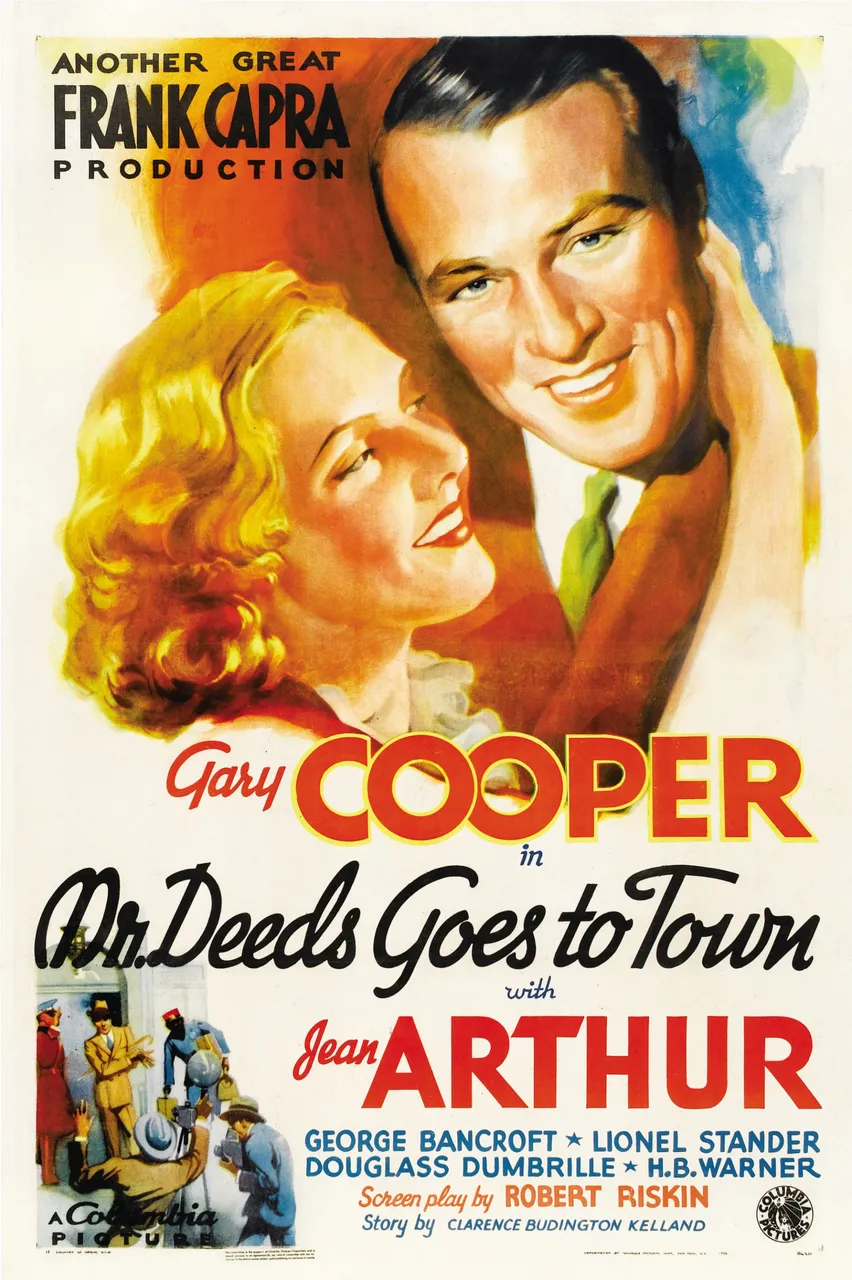
Mr. Deeds Goes to Town is a 1936 American comedy-drama romance film directed by Frank Capra and starring Gary Cooper and Jean Arthur in her first featured role. The film is based on the 1935 short story "Opera Hat" by Clarence Budington Kelland and was written by Robert Riskin in his fifth collaboration with Frank Capra. The plot revolves around Longfellow Deeds, a co-owner of a tallow works, part-time greeting card poet, and tuba-playing inhabitant of the hamlet of Mandrake Falls, Vermont, who inherits a massive fortune and moves to New York City.
The film is known for its screwball comedy, wit, and romance, and has been praised for its performances and its portrayal of the struggles during the Great Depression. It won the 1936 Academy Award for Best Director (Frank Capra) and was nominated for other awards, including Best Picture and Best Actor in a Leading Role for Cooper. The film has been restored in 4K and is considered a classic of the screwball comedy genre.
Plot
- Longfellow Deeds, a co-owner of a tallow works, part-time greeting card poet, and tuba-playing inhabitant of the hamlet of Mandrake Falls, Vermont, inherits a vast fortune from his late uncle.
- Deeds moves to New York City, where he is preyed upon by his uncle's lawyers and publicity-seekers.
- Deeds meets an up-and-coming reporter named Babe Bennett, played by Jean Arthur, who poses as a damsel in distress to get close to him.
- Deeds's simple common sense and honesty help him navigate the complexities of city life and the challenges posed by those trying to take advantage of his fortune.
- Deeds decides to give away his money, which leads to a legal battle to prove his sanity.
- In the end, Deeds returns to Mandrake Falls, where he is heartbroken after learning that the townspeople had expected him to save them from their financial struggles.
Cast
- Gary Cooper as Longfellow Deeds
- Jean Arthur as Babe Bennett
- George Bancroft as MacWade
- Lionel Stander as Cornelius Cobb
- Douglass Dumbrille as Slim
- Raymond Walburn as Pa
- H.B. Warner as Ma
- Ruth Donnelly as Mae
Director: Frank Capra
Writer: Clarence Budington Kelland, Robert Riskin
Box office Gross: $8,362
Distributor: Columbia Pictures
Genre: Comedy
Release Date (Theaters): Apr 16, 1936
Release Date (Streaming): Apr 16, 2012
Themes & Reception
The film Mr. Deeds Goes to Town explores themes of simplicity, honesty, and the contrast between small-town values and big-city opportunism. It also delves into the idea of wealth and its impact on an individual's character and relationships.
Mr. Deeds Goes to Town was well-received, winning the 1936 Academy Award for Best Director for Frank Capra. It was also nominated for Best Picture and Best Actor in a Leading Role for Gary Cooper. The film has been praised for its portrayal of the struggles during the Great Depression and its commentary on the challenges faced by a simple, honest man in a corrupt and greed-driven world.
Challenges Faced
The production of the film faced challenges typical of the era, including budget constraints and the need to create a compelling narrative that resonated with the audience amidst the backdrop of the Great Depression.
Settings
The film is set in both the small town of Mandrake Falls, Vermont, and the bustling metropolis of New York City. The contrast between these two settings serves as a backdrop for the central themes of the movie.
Visual Styles and Techniques
Mr. Deeds Goes to Town is known for its visual style, which captures the essence of both small-town America and the urban landscape of New York City. The film employs various techniques to emphasize the contrast between the two settings and the characters that inhabit them.
Trivia and Fun Facts
- The film is based on the 1935 short story "Opera Hat" by Clarence Budington Kelland, which appeared in serial form in The American Magazine.
- It was the fifth collaboration between director Frank Capra and screenwriter Robert Riskin.
- The film's restoration in 4K has helped preserve its status as a classic of the screwball comedy genre.